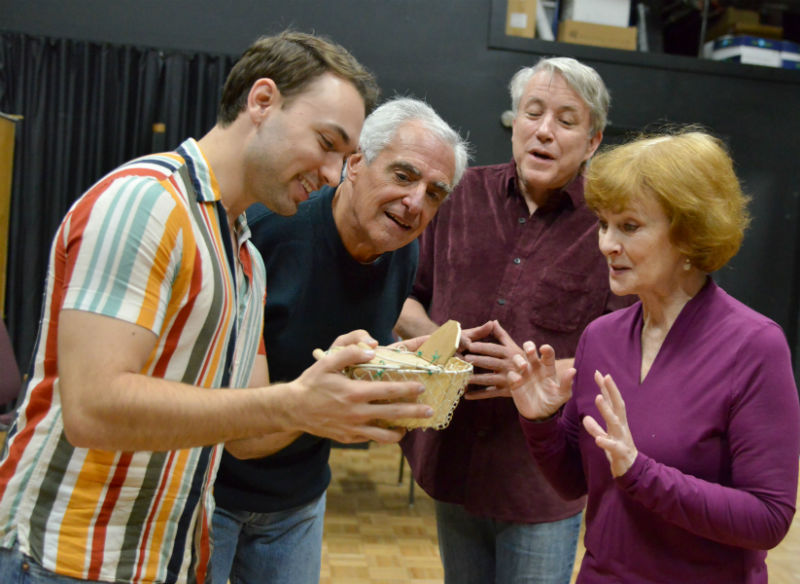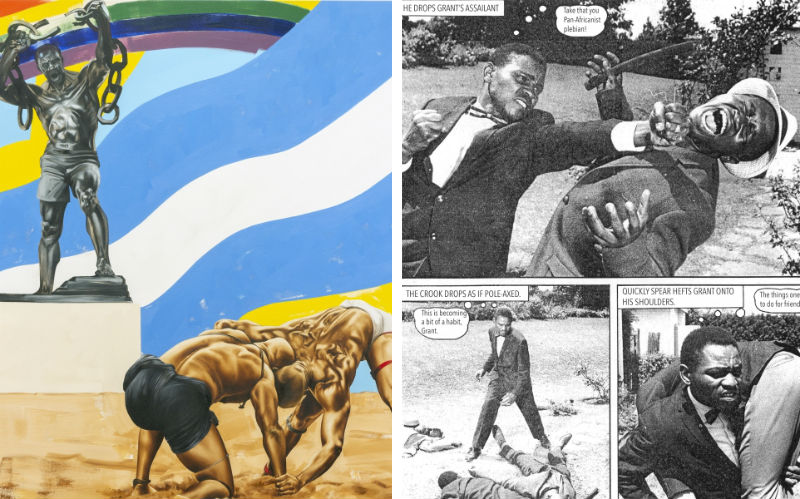Locked-Up With Laughter: A2 Civic Theatre’s "My Three Angels" is a sharp family comedy

When Barbara Mackey King proposed directing My Three Angels for this season at Ann Arbor Civic Theatre, she had two goals in mind. One was for actors and the other for audiences.
“I was in another play at Civic Theatre and everyone was talking about how there weren’t a lot of great plays for older actors,” she said. “I thought I can help with that and I remembered My Three Angels, which has some very fine parts for older, experienced actors.”
She was also looking for a play that would appeal to a diverse audience.
“I chose this play because it’s what I would call a good family comedy,” she said. “By that I mean not Leave It to Beaver or something like that, not for tiny kids. But something that the whole family can enjoy. It’s not too salacious or suggestive or anything like that. It’s something you can bring older kids to.”
She said that’s important for the future of live theater.
A Place to Resist Apathy: “Whose Streets? Our Streets! New York City 1980-2000” at Lane Hall Gallery
![Sylvia Plachy, Graffiti Under the Williamsburg Bridge, black and white photograph]](/sites/default/files/pulp/inline/sylvia-plachy-1987-under-the-williamsburg-bridge.jpg)
Big town civil disobedience meets big-time photojournalism in Whose Streets? Our Streets! New York City 1980-2000 at the University of Michigan Women’s Studies Lane Hall Gallery.
The exhibit features 40 artworks by renowned national and international photographers Nina Berman, Donna Binder, Donna Decesare, Ricky Flores, Frank Fournier, Lori Grinker, Meg Handler, Lisa Kahane, Gabe Kircheimer, Carolina Kroon, Meryl Levin, TL Litt, Dona Ann McAdams, Thomas McGovern, Thomas Muscionico, Brian Palmer, Clayton Patterson, Sandra-Lee Phipps, Sylvia Plachy, Alon Reininger, Richard Renaldi, Joseph Rodriguez, Linda Rosier, Q. Sakamaki, Catherine Smith, and Les Stone.
Lending a timely coherence to this sprawling history are curators Tamar W. Carroll of the Department of History at the Rochester Institute of Technology; Meg Handler, photographer and former photo editor of The Village Voice; Michael Kamber, New York Times photographer, adjunct faculty of the Columbia Journalism School and founder of the Bronx Documentary Center; and Joshua P. Meltzer, assistant professor at the Rochester Institute of Technology.
As the Women’s Studies exhibit gallery statement tells us, “New York’s streets were turbulent and often violent in the 1980s and 1990s, as residents responded to social changes in their city as well as national and international developments. These photographs highlight both the key roles of activists and journalists in enacting democratic social changes, and invite viewers to reflect on how theses social issues, as well as social movements and the practice of journalism, have evolved in recent decades.”
Moon Hooch explores consciousness with a knockout combo of jazz and dance music

Moon Hooch's music has all the manic energy of a city. The Brooklyn group's drums-sax-sax lineup rumbles like the New York City subway system, where the trio spent many hours busking when it formed in 2010. The way the band combines dance beats and avant-garde jazz is akin to a metropolis' relentless forward rhythm that's being intersected by speeding cabs running red lights.
But the nervous energy Moon Hooch exudes in its simultaneously catchy and edgy music is in direct opposition to the way drummer James Muschler and saxophonists Mike Wilbur and Wenzl McGowen live their lives off the stage.
Or even in their touring van.
Moon Hooch's members are avid meditators and they use this practice to stay mentally and physically fit during arduous tours across the U.S.
"Yeah, it’s not easy," McGowen said of touring. "Meditation, Qigong, and breathing exercises are what keeps me going. I try to transmute stress through present moment awareness. I don’t succeed always, but when I am enough present I can stay calm even if the situation is challenging. We usually get together every morning, sit in a circle, breath together and share how we feel. We aren’t doing that every day, but whenever we do it, it really uplifts the group dynamic."
Long-running folk duo Annie and Rod Capps coalesced with a great band for its new album, "When They Fall"

For fans of heartfelt and well-played acoustic roots music, a new album from Ann Arbor duo Annie and Rod Capps is always a treat. But with their latest, When They Fall, something’s a little different.
The songwriting, always smart and heartfelt, has become richer. The musicianship -- fleshed out on the record by Jason Dennie (mandolin and mandola), Dan Ozzie Andrews (bass), and Michael Shimmin (drums and percussion) -- is also better than ever. And the duo is making its most concentrated publicity push. It all feels like something of a step forward for a project that was already a vital and important part of the local music scene.
When They Fall goes from one highlight to the next, but among the most memorable tracks are “Poor Old Me,” showing a great sense of humor with the band sounding particularly lively; the touching “Happy New Year” and “Walking Through” (the latter featuring memorable lines like “I’m praying for the strength to grieve”); and “Build that Fire,” a warm and optimistic conclusion to a truly great recording.
Annie Capps answered a few questions recently via email.
U-M’s take on Gilbert and Sullivan’s "The Pirates of Penzance" zips along in swashbuckling style

It is the very model of a modern musical comedy.
The University of Michigan Department of Music’s production of Gilbert and Sullivan’s ever-popular The Pirates of Penzance moves along faster than the celebrated major-general’s patter song. The tiny Lydia Mendelssohn stage is alive with color, movement, and music.
Director Vincent J. Cardinal has chosen the 1980 Joseph Papp New York version of Penzance with more swashbuckling, dancing and some reinterpretation of Sullivan’s music. That production starred Kevin Kline, Linda Ronstadt, and Rex Smith. U-M’s production is filled to overflowing with musical theater stars of the future.
From the Ancient to the Future: Meleko Mokgosi's "Pan-African Pulp" at UMMA

Right: Pan-African Pulp I (detail), 2019, digital print. Courtesy the artist. © Meleko Mokgosi.
University of Michigan’s Museum of Art has launched a new program of site-specific, commissioned installations as part of a new biennial program, with the monumental work of Meleko Mokgosi. He debuted a solo commission to inaugurate the program, with a show titled Pan-African Pulp.
Mokgosi’s four works boldly fill the Vertical Gallery space at UMMA, with a larger-than-life wall vinyl that extends from the first floor to the ceiling of the third level, a series of enlarged and annotated pages from a Pan-African manifesto, which are displayed below a variety of posters from Pan-African movements, vinyl text that wraps around the second and third level bannisters, and a large painted mural.
A Botswana-born artist living and working in New York City, Mokgosi's works explore the history and meaning of Pan-Africanism, which UMMA guest curator Ali Subotnick defines as “the global movement to unite ethnic groups of sub-Saharan African descent.” Mokgosi takes this movement, which began around the start of the 20th century, and uses it as a starting point to explore themes of “power, national identification, colonialism, globalization, whiteness, transnationality, xenophobia, democracy, art history, gender, labor, and the authoritarian or institutional voice.” Each component of the exhibition engages with one or more of these themes.
All the Town's a Stage: Ann Arbor Civic Theatre celebrates its 90th anniversary

On Broadway in 1929, the Marx Brothers had them rolling in the aisles with Animal Crackers, Louis Armstrong was singing and playing a driving trumpet in “Hot Chocolates,” William Gillette was back for another turn at Sherlock Holmes, and Cole Porter had his first big hit with “Fifty Million Frenchmen.”
On a more serious note, Porgy by Dorothy and DuBose Heyward debuted and Eugene O’Neill Strange Interlude starring Lynn Fontanne was a big draw.
In Ann Arbor, a group with a passion for theater started a private club that began meeting to study and perform script readings. That passion is still glowing as the club that became the Ann Arbor Civic Theatre celebrates its 90th anniversary.
“That was sort of an outlet for people who wanted to get involved in theater but weren’t part of the university, because there wasn’t a community outlet at that time,” said Alexandra Berneis, Civic Theatre executive director. “They met at homes and in basements and things like that. They read plays, thinking about what they would do about creating an artistic outlet for people.”
Paul Bernstein’s debut book of poetry, "What the Owls Know," chronicles a fully lived life

A blurb on the back of What the Owls Know, Paul Bernstein’s book of poetry, says that the reader is guided through the “ground of a fully lived life.” There is no question that Bernstein’s life, like his poems, is fully realized.
Born in New York, Bernstein came to Ann Arbor in 1959 and returned to the city in the late 1960s seeking a Ph.D. in History. “I first published my writing while an undergraduate,” Bernstein says. “But then I got involved in politics. … I was involved with anti-war politics and at some point thought that I should give it up to focus on writing poetry but then protests heated up, the Weathermen began … and I realized it was not the time to get out.”
Double Date in Kerrytown: William Bolcom, Joan Morris, Amy Burton, and John Musto paired up for cabaret

A crowd of concert-goers buzzed with excitement last Sunday as they packed into the seats of Kerrytown Concert House, excited for an afternoon of music with a cabaret duo that over the years has emerged as a community favorite.
Pianist William Bolcom and mezzo-soprano Joan Morris, a husband and wife musical team, are among the leading performers of cabaret music active today, as well as having been members of the Ann Arbor community for over four decades. Both former faculty at the University’s School of Music, Theatre & Dance, they have been concertizing together for over 40 years, and even performed at the very first concert hosted by Kerrytown Concert House some 35 years ago. The duo was joined on the stage Sunday afternoon by another musical couple, soprano Amy Burton and pianist John Musto, for a light-hearted performance billed as “Double Date.”
Great Lakes Ghosts: Roustabout Theatre Troupe Haunts Ypsi With New Zettelmaier Play

Joseph Zettelmaier’s Haunted: The Great Lakes Ghost Project. which closes the Roustabout Theatre Troupe’s season at the Ypsilanti Experimental Space (YES) this month, might never have been written if the founder of another Washtenaw County theater hadn’t encouraged him to write. After studying acting at Shorter University in Georgia, he returned to his family in Michigan and secured an acting apprenticeship at the Purple Rose Theatre Company in Chelsea.
Playwriting? That wasn’t Zettelmaier’s plan.
Apprentices at the Rose often perform on nights when the theater doesn’t have public performances. Sometimes they do original pieces, so Zettelmaier tried his hand at a few pages. “The night we did it, Jeff [Daniels] came up to me and said, ‘Give me 100 pages.’ I had an interest in playwriting, but it was Jeff’s interest in my interest that got me started,” Zettelmaier recalls.


































